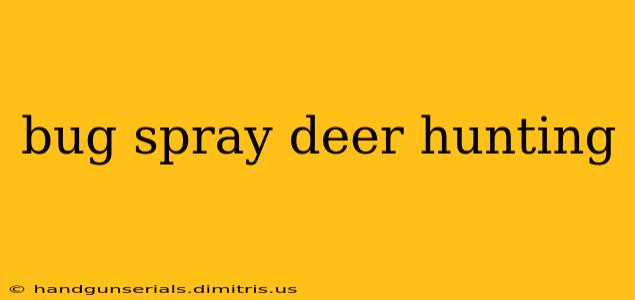Deer hunting requires patience, skill, and the right gear. While focusing on the perfect shot and camouflage, many hunters overlook a crucial element: effective bug spray. A swarm of mosquitoes, ticks, or biting flies can ruin a hunt faster than a missed shot, impacting your comfort, concentration, and even your safety. This guide will help you choose the best bug spray for your next deer hunting expedition.
Understanding the Threats: Deer Hunting & Pests
Deer hunting seasons often coincide with peak insect activity. Depending on your location and the time of year, you might encounter a variety of biting pests, including:
- Mosquitoes: These notorious bloodsuckers are prevalent in many hunting areas, especially near water sources. Their bites are irritating and can carry diseases.
- Ticks: Ticks are a more serious concern, as they can transmit Lyme disease and other illnesses. Their small size makes them difficult to detect, and their bites can go unnoticed until symptoms appear.
- Black Flies (Buffalo Gnats): These tiny flies deliver painful bites that can cause swelling and itching. They are often found near streams and rivers.
- Deer Flies: These larger flies are aggressive biters, targeting exposed skin. Their bites are painful and can cause significant irritation.
Choosing the Right Bug Spray: Key Considerations
Not all bug sprays are created equal. When selecting a repellent for deer hunting, consider the following:
Active Ingredients:
The effectiveness of a bug spray hinges on its active ingredient. Common and effective options include:
- DEET (N,N-Diethyl-meta-toluamide): DEET is a highly effective repellent against a wide range of insects, including mosquitoes, ticks, and black flies. Choose a concentration appropriate for your needs; higher concentrations offer longer-lasting protection but may be harsher on skin.
- Picaridin (KBR 3023): Picaridin is another effective repellent, offering similar protection to DEET but with a milder scent and often gentler on skin.
- IR3535: This repellent is considered effective against mosquitoes and ticks and is generally safe for children and those with sensitive skin.
- Oil of Lemon Eucalyptus (OLE): A plant-based repellent, OLE is effective against mosquitoes and ticks but may not provide as long-lasting protection as DEET or picaridin.
Scent:
Scent is a critical consideration for deer hunting. Strong-smelling bug sprays can potentially alert deer to your presence. Look for odorless or unscented options to minimize your scent profile.
Application & Longevity:
Consider how long the repellent's protection lasts. Some repellents provide several hours of protection, while others require more frequent reapplication. Choose a repellent that matches your expected hunting duration.
Skin Sensitivity:
If you have sensitive skin, opt for a repellent formulated for sensitive skin or a plant-based option like OLE. Always test a small area before applying liberally.
Beyond the Spray: Additional Tips for Pest Control
While bug spray is essential, combining it with other strategies can enhance your protection:
- Clothing: Wear long sleeves, long pants, and a hat to minimize exposed skin.
- Permethrin-treated Clothing: Consider treating your hunting clothes with permethrin, an insecticide that kills ticks and other insects on contact.
- Insect Head Net: A head net can provide additional protection against mosquitoes and other flying insects.
Conclusion: A Successful Hunt Starts with Preparation
Choosing the right bug spray is a crucial element of a successful deer hunting trip. By understanding the types of pests you're likely to encounter, selecting the right active ingredients, and considering factors like scent and skin sensitivity, you can ensure a comfortable and productive hunt, free from the distractions and potential dangers of insect bites. Remember to always follow the manufacturer's instructions for safe and effective use.

